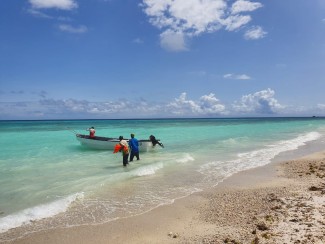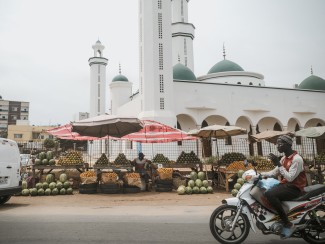Week of discussions fleshes out research results and next steps for electronic trade in the world's poorest countries
With the digital economy evolving rapidly, the world's Least Developed Countries (LDCs) are at a crossroads.
New markets are more accessible than ever before, but a "roadmap" is needed to ensure LDCs benefit from online trade and don't fall further behind, according to etrade expert Sven Callebaut at the UNCTAD-hosted eCommerce Week 2018 in Geneva.
During the “Rapid E-Trade Readiness Assessments in LDCs: From Recommendations to Actions” panel, Callebaut discussed the results of research in countries ranging from Liberia to Laos, and what he found when he delved into their capacity, or lack thereof, to engage in the digital economy.
One commonality was lack of coordination among government agencies, while divergences spread across internet affordability, physical addresses and lending to SMEs, he said.
UNCTAD's etrade assessments in various LDCs, some supported by the Enhanced Integrated Framework (EIF), provide a list of recommendations as countries move ahead with their digital trade work, and are meant to spur action on that front.
In a separate discussion during eCommerce Week 2018 titled, "Analytical Tools for E-Trade: Examples from South Asia and Beyond,” the kind of action as a result of such studies was outlined by EIF Executive Director Ratnakar Adhikari.
"Now every second person in Bhutan is online… The country took the recommendations from the EIF's Diagnostic Trade Integration Study and the E-Trade Readiness Assessment to bring etrade into Bhutan. Now, payments have been reduced from three days to one day and the online commodity exchange now in place for potatoes is increasing incomes for farmers," he said.
Laos has made ecommerce part of its national growth strategy, said Ambassador Kham-Inh Khitchadeth of the Lao People's Democratic Republic at the LDCs panel discussion.
"We want to use it to build more inclusive communities," he said, while acknowledging that the geographic uniqueness of his country poses an ecommerce problem.
Awareness of the challenges and a progressive set of goals are foundational to the aim of the country-specific assessments, already carried out in seven LDCs, in the hopes that growth is spurred and economic potential unlocked.
Callebaut said, “the role of the government is to own the etrade readiness assessment from the request to the launch, and to find a home for the follow-up.”
Liberia’s Industry and Commerce Minister Wilson Tarpeh noted the importance of the research for his country, especially as it recently acceded to the WTO.
“Ecommerce is as much about widening our frontiers as creating much needed jobs, particularly for our youth and women-led small and medium-sized enterprises,” he said.
At the conclusion of that same discussion, EIF Deputy Executive Director Annette Ssemuwemba noted that the assessment results, “touch upon key elements of modern economic development… especially around the coordination."
And with this the discussion came full circle, as – clearly – coordination is key, whether within countries, between the private sector and government or among international organizations and development partners.
"The outcome we are looking for is more trade," she said simply, and that includes equipping everyone with the knowledge and skills to succeed in this new arena termed “etrade."
If you would like to reuse any material published here, please let us know by sending an email to EIF Communications: eifcommunications@wto.org.


